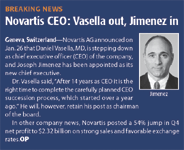Novartis seeks control of Alcon
Novartis AG plans to assume complete control over Alcon Laboratories Inc. in a two-step process that some analysts and some members of Alcon's board of directors are challenging for its fairness under U.S. and Swiss merger laws.

Key Points
Novartis AG plans to assume complete control over Alcon Laboratories Inc. in a two-step process that some analysts and some members of Alcon's board of directors are challenging for its fairness under U.S. and Swiss merger laws.
The deal, announced Jan. 4, begins with Novartis exercising its option to buy a 52% share of Alcon from Nestlé SA for $28 billion, giving Novartis 77% majority ownership of the largest eye-care company in the United States. Alcon has been a subsidiary of Nestlé since the food and beverage giant acquired Alcon in 1977.

The "fair price" has become a source of contention between Novartis, which Chairman and former Chief Executive Officer Daniel Vasella, MD, said "went to great lengths to determine a fair offer," Alcon's Independent Director Committee, and analysts. The committee announced in a Jan. 4 statement it was "disappointed" that Novartis is attempting to "circumvent" minority shareholder protections, and it filed a lawsuit in U.S. District Court in New York to fight the price offered in the takeover. Novartis spokesman Eric Althoff declined to comment on pending litigation.
By the numbers
Novartis is offering Nestlé $180 per share, for a total price of $28.1 billion, as the second stage of its purchase from Nestlé. In April 2008, Novartis purchased 23% for $143 per share, a total of $10.4 billion.
Novartis is proposing to give minority Alcon shareholders 2.8 Novartis shares for each remaining Alcon share-a price then estimated at $153 per share, but that has since dropped to about $147. Novartis Chief Financial Officer Raymund Breu, PhD, said the offer reflects a 12% premium over the "unaffected price" of $137 per share-which, in his opinion, more accurately reflects Alcon's fundamental value, considering lower earnings expectations since 2008 and price vaults based on speculation about Novartis' acquisition.
In a Jan. 4 conference call with investment analysts, Dr. Breu said "The current Alcon share price is inflated above each fundamental value as a result of speculation regarding our potential purchase of the remaining minority."
Analysts reacted sharply to Novartis' explanation since shares had been trading 7% higher on Dec. 31 and because of the higher premium the company is offering Nestlé for its shares. Dr. Breu and Dr. Vasella explained that Nestlé will get more per share because its shares would give Novartis majority control of the board, allowing it to complete the takeover, they believe, with a simple majority vote.
"This is very much in line with what minority shareholders in similar transactions have received," Dr. Breu said on the call.
"It's very important to understand this is not a tender offer," Dr. Vasella added. "It's a merger offer . . . for two companies [that] are incorporated in Switzerland. And that is a fundamentally different situation [from] a usual tender offer. And the only condition is that we offer a fair price."
The fairness of that price is under consideration by Alcon's Independent Directors Committee-Joan W. Miller, MD, chief of ophthalmology, Massachusetts Eye and Ear Infirmary, and chairwoman of the department of ophthalmology, Harvard Medical School; financial expert Thomas G. Plaskett; and health-care executive Lodewijk J.R. de Vink. The board has hired investment-banking firm Greenhill & Co. to analyze the offer. Dr. Miller referred all questions to Steven Lipin of New York-based corporate communications firm Brunswick Group. Lipin, however, did not return calls seeking comment.
The lawsuit filed by the independent directors [see "Alcon's Independent Director Committee calls Novartis proposal 'offensive'"] challenges Alcon, Novartis, and Nestlé for setting two prices for the acquisition. In a statement released Jan. 10 from New York, the Associated Press reported, minority shareholder lawyers said their clients are being "squeezed out at an unfair price."